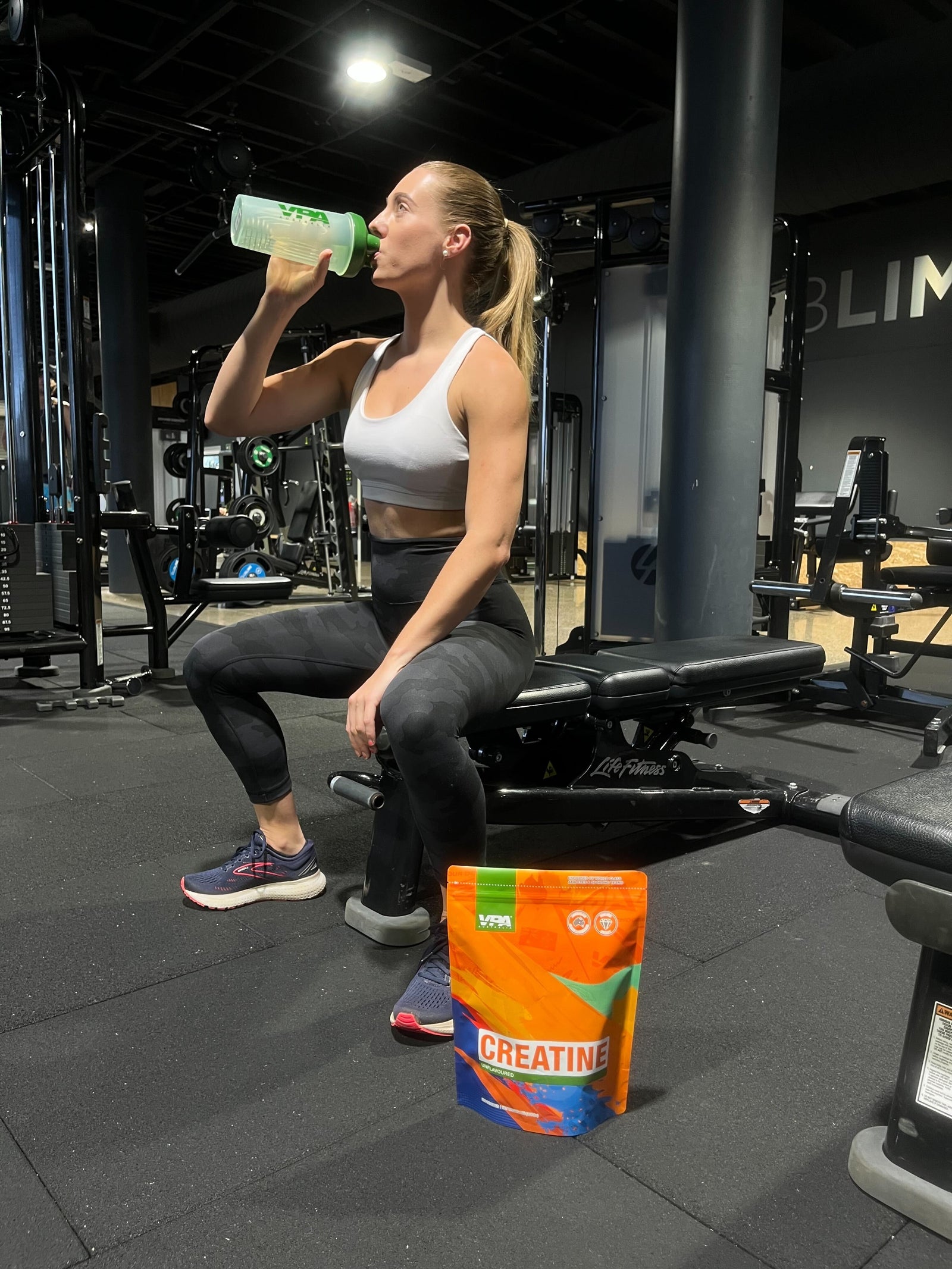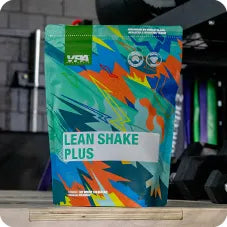Your Cart is Empty
Is Creatine Vegan? What Plant-Based Athletes Need to Know
June 10, 2025 5 min read

For athletes and fitness enthusiasts following a plant-based diet, maintaining peak performance while staying true to ethical and dietary choices is a top priority. One supplement that has become popular in the fitness space, and often raises questions, is creatine.
Is creatine vegan? And if the answer is yes, how can vegans and vegetarians benefit? In this guide, we’ll explore everything you need to know – from what creatine is to how to choose the right vegan-friendly version.
What Is Creatine and Why Is It Important?
As a naturally occurring compound found primarily in muscle cells, creatine produces energy during high-intensity activities like weightlifting or sprinting. It regenerates adenosine triphosphate (ATP) – or, in simple words, the body’s primary energy molecule and fuel.
The body synthesises creatine from three amino acids: glycine, arginine, and methionine. While it’s produced in the liver, kidneys, and pancreas, roughly 95% of it is stored in muscle tissue. The rest is found in the brain, cardiac muscles, and testicles.
Meat, fish, and other animal products are the richest natural sources of creatine. Because of this, those following a vegan or vegetarian diet typically have lower muscle creatine stores than omnivores, making creatine supplementation particularly beneficial and essential for vegetarians and vegans.
Is Creatine Vegan-Friendly?
The short answer is yes – creatine can be vegan, but not all creatine supplements are. While creatine is a molecule that doesn’t contain animal-derived components, the manufacturing process can vary.
Originally, creatine was extracted from animal tissue. However, almost all commercially available creatine today is synthetically produced in laboratories via chemical reactions involving sarcosine (a derivative of the amino acid glycine) and cyanamide (carbon, nitrogen, and hydrogen). These processes do not include animal ingredients and can produce 100% plant-based creatine.
However, not every product is guaranteed to be vegan. Some may include non-vegan additives or gelatine capsules from animal products. Again, there are cross-contamination risks during production. Always check for a vegan certification or clear labelling to ensure you get a product that aligns with your ethics.
Benefits of Creatine Supplementation for Vegans
As creatine is found in animal products, vegetarians and vegans tend to have lower creatine levels. Therefore, adding creatine to a vegan diet yields many performance and health benefits, especially for athletes, bodybuilders, and those engaged in high-intensity training (HIIT activities).
1. Increased Muscle Strength and Power
One of the most well-researched benefits of vegan creatine is improved strength and power output. Pure creatine monohydrate powder enhances phosphocreatine stores in the muscles, allowing for more explosive lifts and better performance during short bursts of intense exercise.
2. Faster Muscle Growth
Creatine has been shown to boost the body’s ability to build muscle mass. Since creatine pulls in water within your muscles, gym freaks swear by this supplement to build an aesthetic-looking “sculpted” body. Vegans often have lower baseline creatine levels, so supplementation can lead to greater gains in lean body mass than omnivores.
3. Enhanced Cognitive Function
Emerging research indicates that creatine supplementation may benefit brain health by improving memory and reducing mental fatigue. This is particularly relevant for vegans, who may have lower brain creatine levels due to the absence of dietary animal sources.
4. Improved Recovery and Reduced Fatigue
Creatine is a well-known supplement to reduce muscle cell damage and inflammation, which can aid in recovery from workouts. It also helps reduce muscle cramping and fatigue, making it one of the best supplements for injury recovery, especially for endurance or strength athletes.
How to Choose a Vegan Creatine Supplement
When choosing a vegan-friendly creatine, a few key factors must be considered to ensure you get a clean, effective product.
Purity
Look for pure creatine monohydrate powder without any fillers, artificial sweeteners, or animal-derived additives. VPA packs pure creatine monohydrate and vegan protein powder in export-quality ISO and HACCP-certified warehouses.
Form
Creatine comes in various forms: monohydrate, hydrochloride, etc. Creatine monohydrate is the most extensively researched and recommended form for performance and recovery benefits. It’s highly bioavailable and cost-effective.
For vegans, a pure creatine monohydrate powder is ideal. It is easier to mix and absorb without the need for capsules or tablets that might contain gelatine.
Certification
Always look for third-party vegan certification or logos from reputable organisations. This ensures the supplement is free from animal products and not tested on animals. VPA employs third-party lab testing by the National Measurement Institute, the authority for Australia’s chemical, biological, physical, and trade testing.
Also, choose products tested for heavy metals, contaminants, and banned substances if you’re a competitive athlete. VPA is one of the few supplement companies certified by Informed Sport, the World Leader for supplement quality assurance, and tested by LGC’s world-class sports anti-doping lab.
Conclusion
So, is creatine vegan? The answer is yes – but with a few caveats. While creatine is a molecule that doesn’t contain animal products, not every supplement on the market is vegan-friendly due to added ingredients, capsule coatings, or risk of contamination. Fortunately, a wide range of plant-based creatine supplements that cater specifically to vegan and vegetarian athletes is now available.
From increasing strength and power to enhancing brain function and supporting recovery, creatine vegan benefits are extensive, especially for those with lower natural creatine levels due to a meat-free diet.
By choosing a pure creatine monohydrate powder with vegan certification, you can reap the full rewards of this performance-enhancing supplement without compromising your lifestyle choices.
FAQs
Can vegans take creatine supplements?
Yes, vegans can and should consider creatine supplementation, especially if they’re involved in strength training or high-intensity sports. Be sure to choose a product labelled or certified as vegan and third-party tested for purity.
Why do vegans need creatine supplementation?
Since creatine is found naturally in meat and fish, vegans tend to have lower muscle creatine stores. Supplementation can help restore those levels, improving physical performance, recovery, and brain function.
Are all creatine supplements vegan?
No. While most creatine supplements are synthetically made, some may include non-vegan (gelatin) capsules or additives. Look for products that specifically state they are vegan or have certification to be sure.
How much creatine should a vegan take daily?
The standard dose is 3–5 grams per day of creatine monohydrate, ideally after a workout or at a consistent time daily. To saturate muscle stores faster, athletes may use a loading phase of 20 grams per day (split into four servings) for 5–7 days, though it's not necessary for everyone.
Are there any side effects of taking creatine as a vegan?
When taken at recommended doses, vegan creatine side effects are generally minimal. Some users may experience water retention, mild bloating, or digestive discomfort during the initial phase. Staying well hydrated can help minimise vegan creatine side effects.
References:
-
Fontaine, A. (2024, March 29). What You Should Know About Creatine: Vegan Dietitian’s Insights. Alyssa Fontaine. Retrieved from https://alyssafontaine.com/creatine-vegan-dietitian-insight/
-
Mayo Clinic Staff. (n.d.). Creatine. Mayo Clinic. Retrieved from https://www.mayoclinic.org/drugs-supplements-creatine/art-20347591
-
Edge Hill University. (2022, March 25). Pre-workout supplements: why five of the six most common ingredients probably aren’t helping you. Retrieved from https://www.edgehill.ac.uk/news/2022/03/pre-workout-supplements-why-five-of-the-six-most-common-ingredients-probably-arent-helping-you/
- VPA Australia. (n.d.). Official website. Retrieved from https://www.vpa.com.au

Caitlin Grotjahn
Caitlin Grotjahn brings a rich mix of experience to the health and fitness industry, supported by an athletic background spanning bodybuilding, powerlifting, and marathon running. Her accolades include holding the APL National Bench Press Record for Juniors and securing a top rank in her powerlifting division. Currently, Caitlin is training for HYROX competitions and marathons in Osaka and Gold Coast. Her varied expertise makes her insights particularly valuable to fitness enthusiasts.
Also in Supplements

Fitness Goals for 2026 Made Simple: How to Set, Plan & Stick to Them
January 22, 2026 5 min read
Read More
The Ultimate 12-Week HYROX Training Plan (Beginner-Friendly + Expert-Approved)
December 04, 2025 7 min read
Read More Recent Articles
- 6 Best Pre-Workout Supplements in Australia (2026 Guide)
- Fitness Goals for 2026 Made Simple: How to Set, Plan & Stick to Them
- The Ultimate 12-Week HYROX Training Plan (Beginner-Friendly + Expert-Approved)
- What Is HYROX? The Complete Beginner’s Guide to the World’s Fastest-Growing Fitness Race
- The Ultimate HYROX Fuel Plan: When and How to Use Energy Gels for Maximum Output
- Collagen for Tendon Repair: Can Supplements Support Recovery?
- What Is Creatine Monohydrate? Benefits, Safety & How to Use It
- How Is Creatine Made? (Natural, Synthetic & Quality Standards Explained)
- What’s the Best Creatine in Australia? Here’s Why Monohydrate Still Reigns Supreme
- What Is Whey Protein? A Beginner’s Guide
${{amount}}













